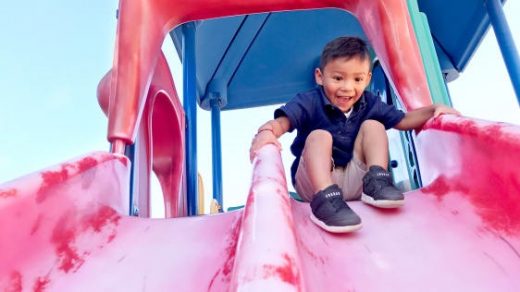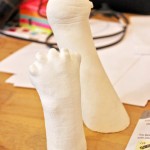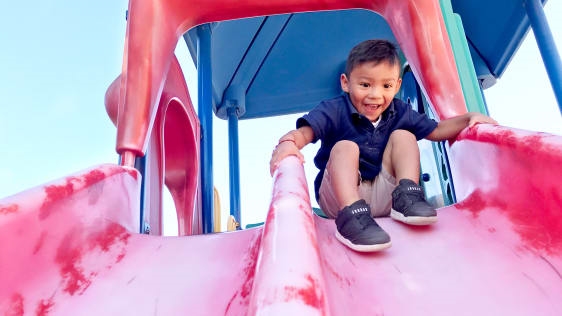This Giving Platform Lets Kids Donate To Other Kids
When you give kids cash, they tend to sock it away in a piggy bank in order to buy something special someday. Which means most probably don’t consider that those funds could actually go toward charity instead of consumerism.
Part of that may be a marketing issue: Children see commercials for things they want all the time. But at the same time, early lessons in selflessness aren’t always super personal either, something known to be a key factor in whether donors feel satisfied and form giving habits. UNICEF’s trick or treat program with little orange change boxes may raise gobs of money, but the kids participating don’t see the resulting change directly. It’s hard to envision what someone dropping quarters in those slots really means.
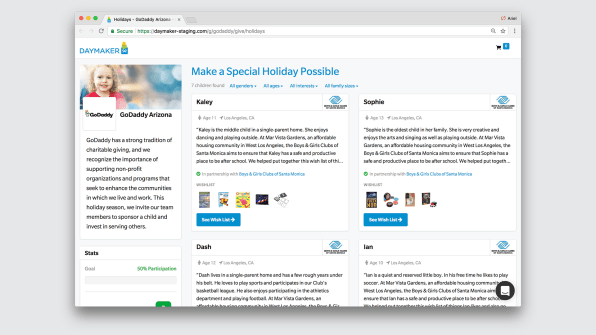
Daymaker, a giving platform that started in 2015 has their own marketing tactic aimed at reversing that. The company targets grownups to give gifts to kids in need with an obvious extra sell point: For parents, this could be a teaching moment for their own kids, who can be easily involved in the very transparent process.
That process looks a lot like do-gooder mashup between Facebook and Amazon. The company works with nonprofits and schools to identify impoverished kids that could benefit from things like a new backpack or shoes around back-to-school time, or some cool educational toys during the holidays. Rather than put out a call for general donations, Daymaker then uses a variation of the adopt-a-child fundraising method. It creates profiles of those kids that include a specific wish list of items that people can purchase for them. The goods are then delivered to the child in need through the partner group.
Potential givers can search the site by location, gender, age, child interests, and family size. The result might be learning about someone like Laray, Age 5, in Los Angeles, California. “Laray enjoys dolls, Frozen, and kitchen play,” reads a profile that notes her association with the Volunteers of America Head Start program in Los Angeles. As her bio explains, Laray’s mother is a stay-at-home mom who has a newborn, and while her father works, the family doesn’t have enough for birthday presents.
Below that, are toys you can purchase, which can be paid for individually by different givers, or altogether if someone wanted to sponsor the entire list. In this case, the goods would then ship to Volunteers of America to distribute. Prices range from an $11 Chutes and Ladders game to Koala Capers, a $15 dollar book with picture matching exercises. Most goods are priced at around what you might find them at in stores. Depending on what is in each kid’s checkout cart, the price to sponsor the whole package may range between $70 and $150.

Daymaker Cofounder and CEO Thomas Doochin considers this a way to connect the simplicity of online donating to a format with more transparency and meaning. For parents who might shop with their own kids sitting next to them, it could also encourage more generosity an early age, which, over time, might reset the social norm. “We think there’s an incredible amount of good that can be done if we start showing kids how good it feels to give back at five, six, and seven, instead of waiting until 25 or 30, which is typically the first time somebody is thinking about philanthropic endeavors,” Doochin adds.
But the company has seen a recent surge in growth for another reason: Corporations want to use the platform as a part of their own in-house employee giving programs. Turns out, the platform is good for people of any age.
Daymaker now sets up corporate giving pages, which lets companies track their overall impact or compete between offices to do the most good. It piloted the concept in 2016 with just five companies and saw that overall 75% of their employees participated. Emboldened, the company decided to expand its reach, adding 50 corporations including GoDaddy, WeWork, Salesforce, and Ally Bank this year.
With more potential givers using the service, it’s also trying to expand its reach: In addition to working with the groups like the Boys and Girls Club, and Salvation Army to find recipients, Daymaker recently added the New York City Public Housing department and parts of the Los Angeles School District to create nearly 20,000 profiles with wish lists this holiday season.
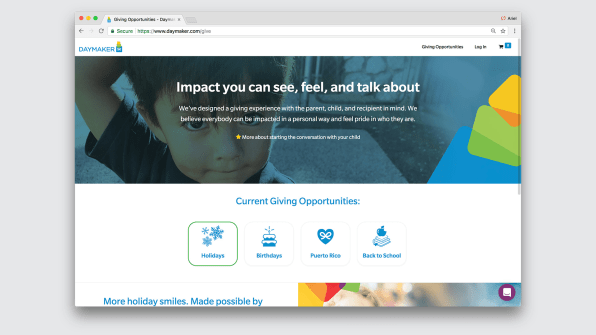
As the corporate giving programs take off, the company projects its user base to nearly quadruple by the end of the year, growing from around 11,000 registered givers this fall to at least 40,000 by the end of the holiday season. Last year the group helped deliver more than 8,000 goods. This year it projects to ship over 90,000.
Partnering with companies is a great way to increase impact: Many have charitable matching programs or offer some incentive—like Daymaker gift cards—to spur involvement. That will definitely help grow the platform’s shopping power, which also relies on less consistent approaches like suggesting parents encourage their kids to pledge a birthday to the cause. Instead of people buying the birthday kid a gift, they could buy a gift for someone on Daymaker.
And there is certainly a growing need. In addition to school and holiday shopping pushes, the group recently partnered with nonprofits to try to match givers with the kids affected by the hurricane in Puerto Rico.
Daymaker is a for-profit venture. It works with manufacturers to secure goods at near wholesale costs, which it then sells at a fair retail price. Some of those companies include Skip Hop and High Sierra (backpacks), Toms (shoes), and GoldieBlox and Seedling (toys). That revenue covers things like shipping costs and platform development–for groups that receive the product, there’s a backend system that ensures everything stays organized and is given out correctly. Because they make a profit on each sale, they don’t have to charge transaction fees, and donors can see exactly what they’re buying, at what price, and who will receive the good, eliminating much of the uncertainty in online transactions.
“I think from the very beginning we said, ‘Look, we want to build a pretty holistic and agnostic giving experience,” Doochin says to explain the new ways Daymaker is being adopted. He doesn’t see this as a replacement for cash giving, which when done directly is proving to be an important lifeline in many situations. Instead, it’s a way to provide a specific product to a person who will really benefit from it. There’s nothing like giving someone something they actually want.
Fast Company , Read Full Story
(29)

